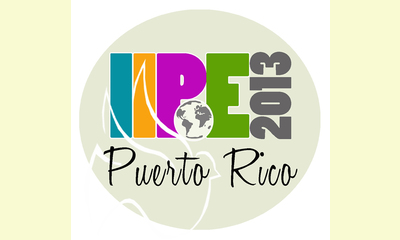|
|
International Institute on Peace Education 2013 - Puerto Rico
un article par International Institute on Peace Education (abridged)
The 2013 International Institute on Peace Education (IIPE) will take place in San Juan, Puerto Rico from July 7-14, 2013. This year’s Institute is being co-organized in partnership with the UNESCO Chair for Peace Education at the University of Puerto Rico and the National Peace Academy, USA (home of the IIPE secretariat).

click on photo to enlarge
For 30 years, the IIPE has brought together educators, professional workers and activists in the field of peace education from around the world to exchange experiences and learn with and from each other in an intensive, short-term learning community that embodies the practices and principles of critical, participatory peace pedagogy. IIPE 2013 participants, many whom will be drawn from Puerto Rico, the Caribbean, Central, and South America, will join with representatives from other world regions. This residential learning exchange will weave together experiential and theoretical contributions of participants to illuminate diverse views, explore educational applications, and assess possibilities for practical steps toward addressing the theme of “a possible world free from violence.” . .
Human rights learning and peace education are fundamental in overcoming the culture of violence and building in concert another possible world. Thus in this IIPE, our main goal is that educators from all parts of the world share alternate pedagogies, proposals, and politics based on the respect of human rights and the construction of a culture of peace.
We will also share some of the initiatives undertaken in Puerto Rico to prevent violence, promote civic engagement, and build a just, positive and holistic peace. The University of Puerto Rico’s UNESCO Chair for Peace Education, as host institution of the IIPE, shares this trajectory based upon a liberatory pedagogy committed to peace with justice and equality.
In this IIPE, we shall explore the principles and practices of a wide range of critical, creative, participatory, dialogical, and emancipatory pedagogies capable of promoting a world free from violence. We invite participants to share programs, projects, activities, learning experiences, methodologies and materials they have developed to this end. These can include initiatives for human rights learning, conflict resolution, sustainable development and promotion of a culture of peace. We will also look at a diversity of peace building proposals, be these individual or collective, real or prospective projects, theoretical-practical alternatives, and other viable efforts that address the problematic of violence in its complexity. We expect to learn from the proposals, projects and initiatives generated in real scenarios by those who strive to overcome the problems of violence through their pedagogical and social actions. We will also enquire on how these pedagogies and proposals could lead to educational and social politics of change and transformation that contribute to minimize the multiple manifestations of violence.
The main purpose of exchanging alternative pedagogies, proposals and politics is to attain shared learning in a community of participants committed to actions for well-being and peace in the particular places where they live, work, and dream. Their commitment provides for establishing ties and joint efforts for thinking and creating, from particular countries and spaces, a possible world free from violence.
For inquiries in English: International Institute on Peace Education, care of National Peace Academy, email: info@i-i-p-e.org, tel: 202-556-1075.
(Click here for a Spanish version of this article)
|








|
DISCUSSION
Question(s) liée(s) à cet article:
How do we promote a human rights, peace based education?,
* * * * *
Commentaire le plus récent:
Question: what is the relation between peace and education?
http://cpnn-world.org/new/?p=4780
We teach the science of war on an even and equal basis with the 3Rs and we maintain it with more resources than any other school. Further, we have done this consistently for a couple of thousand years, long before education was institutionalized for all children. And we have never questioned the wisdom of teaching millions of civilians how to kill while never giving the same credence, or any for that matter, to the science of peace, the study of anti-war, of reconciliation. With this inured mindset leaders choose to fund boot camps and officer training colleges and by omission deprive youth of the better choice.
If we can teach war and violence with such commitment to suit the purposes of generals and the arms trade, where are the rest of us who have a greater need for peace and conciliation than anyone anywhere has for the killing fields? Why have civilians not demanded peace education long ago and why don't we have it now?

|
|









